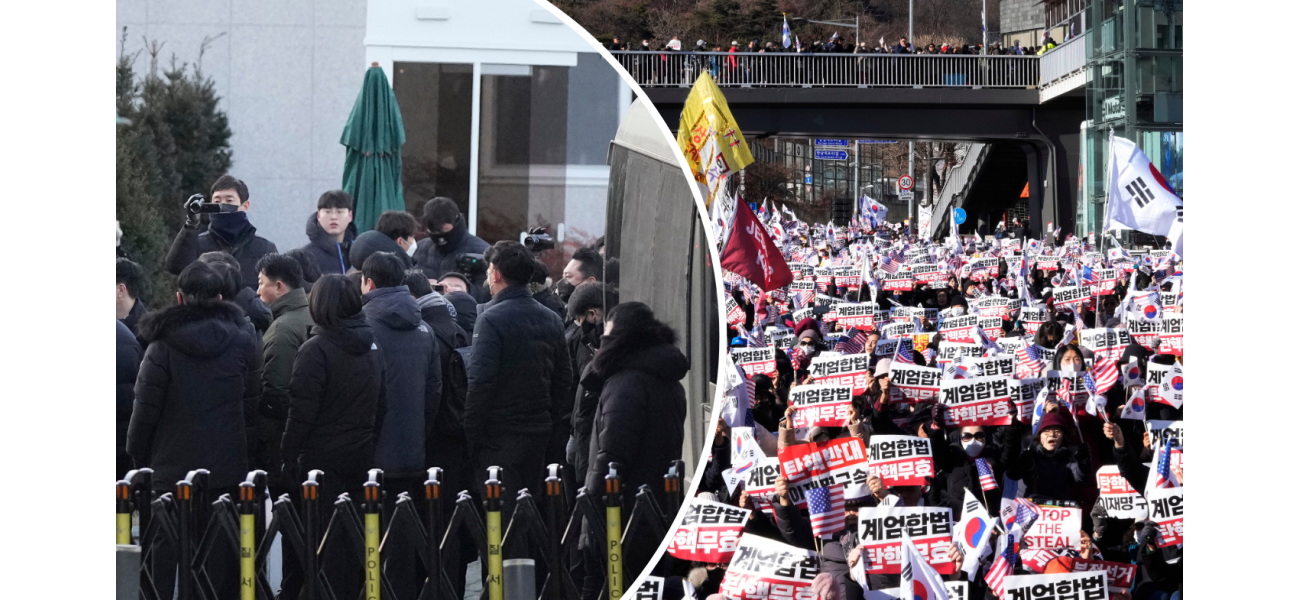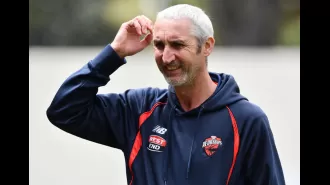Violent confrontation during attempted arrest of South Korean president.
Investigators and police searched the presidential residence as Yoon Suk Yeol's supporters looked on.
January 3rd 2025.

Last month, South Korean investigators made an attempt to detain Yoon Suk Yeol, the impeached President, over his recent declaration of martial law. As his supporters gathered near his residence in Seoul, they vowed to protect him at all costs.
In a scene that could have been taken from a movie, about 20 investigators from the Corruption Investigation Office for High-Ranking Officials and police officers were seen entering the gate of Yoon's residence in Seoul to execute a warrant for his detention. The tension was palpable as it wasn't clear whether the president would cooperate with the authorities or not.
In a defiant and passionate New Year's message to his conservative supporters who were rallying outside his residence, Yoon declared that he would "fight to the end" against what he described as "anti-state forces". His lawyers also joined in the fight, describing the warrant for his detention as "invalid" and "illegal". However, the anti-corruption agency did not confirm whether the investigators were successful in entering Yoon's residential building.
According to YTN television, there were some scuffles between the investigators and police as they confronted the presidential security forces. Earlier in the morning, investigators from the anti-corruption agency were seen loading boxes into several vehicles before leaving their building in the city of Gwacheon. Later, television footage showed these vehicles maneuvering through the tightly packed and barricaded streets near Yoon's residence.
On Tuesday, a Seoul court issued a warrant for Yoon's detention after he refused to appear for questioning and blocked searches of his office, hindering an investigation into possible rebellion charges. This warrant is valid for one week, giving investigators time to make another attempt to detain Yoon. However, with thousands of police officers already gathered at Yoon's residence and forming a perimeter around a growing number of pro-Yoon protesters, it would not be an easy task.
If Yoon is indeed detained, the anti-corruption agency will have 48 hours to either request a warrant for his formal arrest or release him. Yoon's defense minister, police chief, and several top military commanders have already been arrested for their roles in the martial law enactment. Yoon's lawyers argue that the court's detention warrant is invalid and accuse the anti-corruption agency of lacking the legal authority to investigate rebellion charges.
In an interesting turn of events, Yoon's legal team has warned that any attempt by the anti-corruption agency to use police units for his detention would exceed their legal authority and could result in the officers facing arrest by either the presidential security service or citizens. This has added to the already tense atmosphere, with some experts believing that the agency might instead issue another summons for Yoon to appear for questioning.
The liberal opposition Democratic Party, which led the legislative vote to impeach Yoon, has accused him of trying to mobilize his supporters to block his detention and has called for law enforcement authorities to execute the warrant immediately. Meanwhile, thousands of Yoon's supporters have braved subfreezing temperatures and rallied near his residence, chanting slogans and waving flags in his support.
Yoon's fate now lies in the hands of the Constitutional Court, which has begun deliberations on whether to uphold the impeachment or reinstate him as the President. To formally end his presidency, at least six of the nine justices must vote in favor. The National Assembly also voted to impeach Prime Minister Han Duck-soo, who became acting president after Yoon's powers were suspended, for his reluctance to fill three Constitutional Court vacancies. However, with the recent appointments of two new justices, the chances of the court upholding Yoon's impeachment may have increased.
After only six hours, Yoon's imposition of martial law ended when the National Assembly voted unanimously to lift it, despite attempts by heavily armed soldiers to prevent them from voting. Yoon has defended his decision, portraying it as a necessary act of governance to warn against the Democratic Party, which he has labeled as an "anti-state" force obstructing his agenda with their legislative majority.
In the midst of all this political turmoil, it is clear that the fate of Yoon Suk Yeol and the future of South Korea rests in the hands of the law and the judicial system.
In a scene that could have been taken from a movie, about 20 investigators from the Corruption Investigation Office for High-Ranking Officials and police officers were seen entering the gate of Yoon's residence in Seoul to execute a warrant for his detention. The tension was palpable as it wasn't clear whether the president would cooperate with the authorities or not.
In a defiant and passionate New Year's message to his conservative supporters who were rallying outside his residence, Yoon declared that he would "fight to the end" against what he described as "anti-state forces". His lawyers also joined in the fight, describing the warrant for his detention as "invalid" and "illegal". However, the anti-corruption agency did not confirm whether the investigators were successful in entering Yoon's residential building.
According to YTN television, there were some scuffles between the investigators and police as they confronted the presidential security forces. Earlier in the morning, investigators from the anti-corruption agency were seen loading boxes into several vehicles before leaving their building in the city of Gwacheon. Later, television footage showed these vehicles maneuvering through the tightly packed and barricaded streets near Yoon's residence.
On Tuesday, a Seoul court issued a warrant for Yoon's detention after he refused to appear for questioning and blocked searches of his office, hindering an investigation into possible rebellion charges. This warrant is valid for one week, giving investigators time to make another attempt to detain Yoon. However, with thousands of police officers already gathered at Yoon's residence and forming a perimeter around a growing number of pro-Yoon protesters, it would not be an easy task.
If Yoon is indeed detained, the anti-corruption agency will have 48 hours to either request a warrant for his formal arrest or release him. Yoon's defense minister, police chief, and several top military commanders have already been arrested for their roles in the martial law enactment. Yoon's lawyers argue that the court's detention warrant is invalid and accuse the anti-corruption agency of lacking the legal authority to investigate rebellion charges.
In an interesting turn of events, Yoon's legal team has warned that any attempt by the anti-corruption agency to use police units for his detention would exceed their legal authority and could result in the officers facing arrest by either the presidential security service or citizens. This has added to the already tense atmosphere, with some experts believing that the agency might instead issue another summons for Yoon to appear for questioning.
The liberal opposition Democratic Party, which led the legislative vote to impeach Yoon, has accused him of trying to mobilize his supporters to block his detention and has called for law enforcement authorities to execute the warrant immediately. Meanwhile, thousands of Yoon's supporters have braved subfreezing temperatures and rallied near his residence, chanting slogans and waving flags in his support.
Yoon's fate now lies in the hands of the Constitutional Court, which has begun deliberations on whether to uphold the impeachment or reinstate him as the President. To formally end his presidency, at least six of the nine justices must vote in favor. The National Assembly also voted to impeach Prime Minister Han Duck-soo, who became acting president after Yoon's powers were suspended, for his reluctance to fill three Constitutional Court vacancies. However, with the recent appointments of two new justices, the chances of the court upholding Yoon's impeachment may have increased.
After only six hours, Yoon's imposition of martial law ended when the National Assembly voted unanimously to lift it, despite attempts by heavily armed soldiers to prevent them from voting. Yoon has defended his decision, portraying it as a necessary act of governance to warn against the Democratic Party, which he has labeled as an "anti-state" force obstructing his agenda with their legislative majority.
In the midst of all this political turmoil, it is clear that the fate of Yoon Suk Yeol and the future of South Korea rests in the hands of the law and the judicial system.
[This article has been trending online recently and has been generated with AI. Your feed is customized.]
[Generative AI is experimental.]
0
0
Submit Comment





